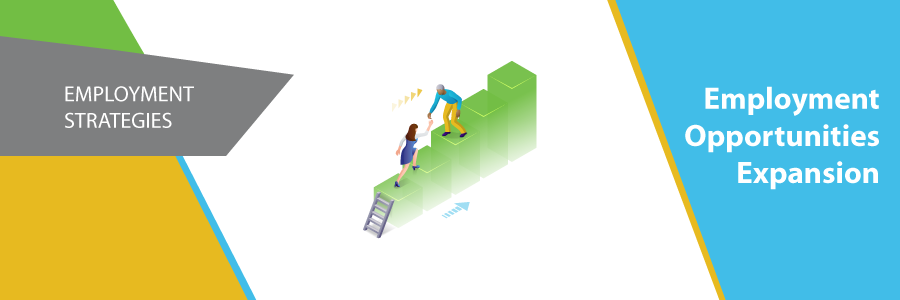Employment Opportunities Expansion
Employment Opportunities Expansion
Finding a job that’s a good “fit” can be difficult for anyone, but especially so for a person with a disability who may require additional services and supports to participate in job-seeking activities and maintain quality employment. The challenges are even greater in an economically depressed community where jobs are few and the competition for them is high.
Employment opportunities expansion seeks to increase opportunities for employment for people with disabilities in communities with limited economic activity and resources. It uses collaborative, best-practice approaches to supporting people with disabilities find and maintain quality employment.
How Does it Work?
Vocational rehabilitation professionals use innovative approaches to increasing opportunities for employment in communities with few opportunities for employment. These approaches include:
Community Outreach and Orientation
Many employers and community members may not be aware that people with disabilities can work as well as a person without a disability, with the right services and supports. To inform them of the possibilities around employing a person with disabilities, develop a solid community outreach and orientation strategy that includes engagement with:
- Business Advisory Councils
- Chambers of Commerce
- Workforce Development Boards
- Community and Business Stakeholders
Community Needs and Resource Assessment
Understanding a community’s unique characteristics and identifying its needs, service gaps, strengths, and resources enables vocational rehabilitation professionals to develop strategies to overcome identified barriers and build on strengths. Learn more about Community Needs and Resource Assessment.
Alternative Paths to Employment
Vocational rehabilitation offers best practices for innovative approaches to employment, including:
- Customized Employment
Customized employment is a flexible process that connects a job seeker who has unique interests and abilities to an employer who has an unmet business need. A job is customized to fit the needs of both the employer and the job seeker, creating a win-win employment - Self-Employment
Self-employment can offer benefits to people with disabilities. These may include making their own business decisions, setting their own schedule, working around their unique strengths and limitations, the option to work at home, having a job that matches their skills and interests, and the availability of Social Security incentives for growing a business. - Individual Placement and Support
Getting the job is the start of the process rather than the end point in individual placement and support. Individuals receive support based on their individual job needs, abilities, and interests. Employment specialists may also provide support to employers in line with the individual’s wishes. - Work-Based Learning
Work-based learning is an opportunity for people with disabilities to explore potential careers through hands-on experience and customized training. Work-based learning opportunities include:- Registered Apprenticeships
- Pre-Apprenticeship Programs
- Work Experiences and Internships
- Transitional Jobs
- On-the-Job Training
- Customized Training
- Incumbent Worker Training

Want to know more about how this employment strategy can be incorporated into your work? Check out these resources:

Featured Training
Watch webcasts to gain valuable information that will help improve employment outcomes and quality of employment for people you serve.
- Self-Employment from the April 2021 Leadership Academy
- Expanding Employment Opportunities for Underserved Populations from the May 2020 Leadership Academy
- Self-Employment from the July 2020 Leadership Academy
- Working with diverse populations, partnering with local churches and faith communities, and developing a resource guide from the June 2020 Leadership Academy
- E3 LGBTQ+ and Bias Training

Selected Tools Resources
These tools and resources offer information to support your practice.

Related Research
Project E3’s research summaries provide an “At-a-Glance” overview the latest research findings, as well as recommendations for best practices and how to incorporate them in your work.
- VR Agency Operations and Services that Lead to Employment
- Effective Strategies for a Dual-Customer Approach
- Partnerships in Employment: A State VR Initiative
- Employer Perspectives on Disability Inclusion
- Self-Employment: A Viable Option in Vocational Rehabilitation
- Job Quality for Americans with Disabilities
- WIOA Desk Reference: Work-Based Learning Overview

Strategy Use in Targeted Communities
All of the Project E3 Targeted Communities provided Employment Opportunities Expansion:

